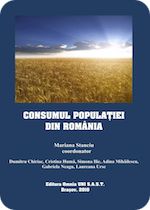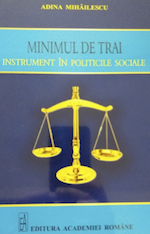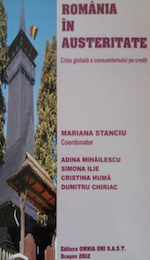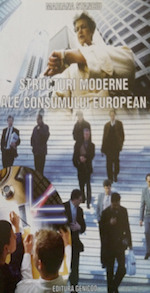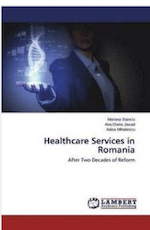The Standard of Living, Income and Consumption is a research program that aims at analyzing the living standard and the links between the income level and the structure / volume of consumption of goods and services of the Romanian population in an international comparative perspective.The various dimensions of living standard and the relationship between incomes and consumption are mainly explored. The program also looks at: the structure and volume of economic and financial capital of households, the supply of goods and services to the population (including consumer protection), housing conditions, the impact of the economic and social policies on the standard of living, the effect of European policies on living standards in Romania, patterns of consumption, the dynamics of the minimum consumption basket for different categories of households, and poverty.
Data used in analyses come from national and international statistics, and from European/international surveys. The methodology and the ″minimum consumption basket″ data set include a continuous series for the period 1990─2018.
Coordinators: Dr. Mariana Stanciu and dr. Adina Mihăilescu
Selected publications:
Mariana Stanciu, ed.The ecological dimension of goods and services consumption. Academia Română, INCE, ICCV, 2008.
Mihăilescu, Adina. 2014. Minimum standard of living threshold.A tool for social policy. București: Academia Română, 2014.
Stanciu, Mariana, ed. Adina Mihăilescu. Simona Ilie. Cristina Humă. Dumitru Chiriac. Romania in austerity times. The global crisis of credit consumerism.Braşov: Omnia UNI, 2012.
Mihăilescu, Adina. Minimum standard of living threshold.A tool for social policy. București: Editura Academiei Române, 2014.
Stanciu Mariana şi Adina Mihăilescu, “The access of population with small incomes to a decent level of consumption.” Revista de Sociologie Românească2(2013): 28-41.
Stanciu, Mariana şi Adina Mihăilescu. “The right to a decent standard of living”. In The European culture for human rights. The right of happinessedited byE. Zamfir, F. Maggino, 147-155, Cambridge Scholars Publishing, 2013.
Stanciu, Mariana, ed. Living conditions of families with children in Romania. Academia Română, INCE, ICCV, 2008.
Stanciu, Mariana, ed. Romania in austerity. The global crisis of credit based consumption. Braşov: Omnia UNI, 2012.
Stanciu, Mariana. “Objective factors of the high poverty persistence in Romania”. In Clusters as drivers of value chain. Development across the Danube region edited byC. B. Păuna şi T. Diaconescu, București: Editura Economică, 2016.
Stanciu, Mariana. Research methods of consumption models. Bucureşti: CIDE, 2006.
Alte noutăți
Understanding Migrant Realities: Research-led Teaching about Migrations in Diversifying Societies” (MIGRAEDU)
Our colleagues, Alexandra Deliu and Bogdan Voicu, are currently running a project in cooperation with University Civitas (Poland), funded by a grant of the Polish NAWA agency (grant BPN/PST/2023/1/00135/DEC/0). A full description is available below....
Eastern-European associations facing contemporary challenges. A dynamic inspection of convergence and similarities, with a focus on Romania
Assn.Dyn - Intentions Assn.Dyn is a project targeting the understanding of dynamics of membership in civic associations across Europe, with a focus on the CEE region. Team: Bogdan Voicu, Marian Vasile, Alexandra Deliu, Eugen Glăvan, Dana Țălnar-Naghi Grant: UEFISCDI...
The 5th RoMig International Conference: Puzzling Realities of the Romanian Migration within the Current Global Contexts
The 5th RoMig International Conference: Puzzling Realities of the Romanian Migration within the Current Global Contexts In 31 October – 1 November 2025, the 5th international conference of the Romanian Network for Migration Studies will take place in Sibiu, hosted by...
Profiling Made Better: Enhancing NEETs’ Activation Pathways
Profiling Made Better: Enhancing NEETs' Activation Pathways Profiling Made Better: Building a Better Activation Pathway for NEETs As the atWork4NEETs project wraps up its third semester, we are excited to share the latest developments from the consortium’s...
Webinar on Profiling NEETs and the 4 selected Good Practices
Webinar on Profiling NEETs and the 4 selected Good Practices As the atWork4NEETs project concludes its third semester, we are delighted to announce the latest developments from the consortium’s focus on “Profiling NEETs to Establish a More Consistent and Effective...
Horizon Europe project Re-Place – Reframing non-metropolitan left behind places through mobility and alternative development newsletter
Horizon Europe project Re-Place - Reframing non-metropolitan left behind places through mobility and alternative development newsletter Within the Re-Place project, a newsletter series has been launched, with two issues publicly available so far. The first two...
Horizon Europe project Re-Place – Reframing non-metropolitan left behind places through mobility and alternative development – the annual consortium meeting in Riga
Horizon Europe project Re-Place - Reframing non-metropolitan left behind places through mobility and alternative development – the annual consortium meeting in Riga The 2024 consortium meeting in the Re-place project was held on 18-19 April in Riga, hosted by the...
Re-Place – Reframing non-metropolitan left behind places through mobility and alternative development
Re-Place - Reframing non-metropolitan left behind places through mobility and alternative development (Horizon grant #101094087) The Re-Place is available at https://replace-horizon.eu/ The Re-Place project is set to explore the complex issues faced...
Quality of Life Journal: CfP Special Issue “The role of leisure activities and leisure time in quality of life (subjective well-being, life satisfaction)”
***Extended deadline for abstract submission: 20 February*** Guest editors: Michala Lustigova, Anna Altova, Charles University, Faculty of Science, Research Centre on Health, Quality of Life and Lifestyle in a Geodemographic and Socioeconomic Context (GeoQol) Dear...
Social and online media use, in the context of recent crises (with Covid 19 and the war in Ukraine on focus)
The pandemic context has created the prerequisites for the development of social media and online medium utilizations. Digital solutions were largely used in various activity domains, especially during the pandemics time. Accordingly, the perspectives of such a theme...
Broșura de prezentare a ICCV, incluzând direcțiile de cercetare, programele instituționale, publicațiile relevante și domeniile de expertiză ale Institutului, poate fi descărcată aici:
Institutul de Cercetare a Calității Vieții - 30 de ani de cercetare în beneficiul comunității

